Search the Special Collections and Archives Portal
Search Results
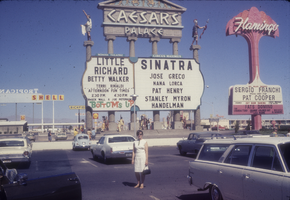
Slide of the Caesars Palace marquee, Las Vegas, 1969
Date
1969
Archival Collection
Description
An unidentified woman standing in front of the marque for the Caesars Palace located at 3570 South Las Vegas Boulevard Las Vegas, Nevada. The left side of the marquee reads: "Little Richard, Betty Walker, Terri Rindaldi; Afternoon fun times 2:30 P.M. - 4:30 P.M. Breck Wall & Joe Peterson's Bottoms Up." The right side of the marquee reads: "Sinatra; Jose Greco; Nana Lorca; Pat Henry; Stanley Myron Handelman."
Image
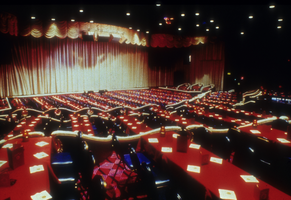
Slide of the Circus Maximus Showroom at Caesars Palace, Las Vegas, circa 1970s - 1980s
Date
1970 to 1989
Archival Collection
Description
An interior view of the empty Circus Maximus Showroom at the Caesars Palace in Las Vegas, Nevada.
Image
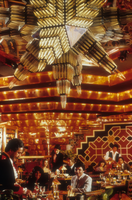
Slide of the Spanish Steps Steak and Seafood House at Caesars Palace, Las Vegas, circa 1970s
Date
1970 to 1979
Archival Collection
Description
An interior view of people serving and dining at the Spanish Steps Steak and Seafood House inside of the Caesars Palace Hotel and Casino in Las Vegas, Nevada.
Image

Slide of the Villa Suite at Caesars Palace, Las Vegas, circa late 1970s - early 1980s
Date
1975 to 1985
Archival Collection
Description
People posing inside of the Villa Suite at Caesars Palace Hotel and Casino in Las Vegas, Nevada.
Image
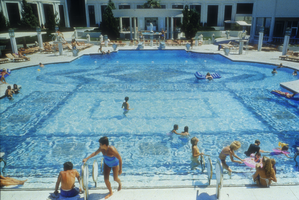
Slide of the Caesars Palace Hotel and Casino, Las Vegas, circa late 1970s - early 1980
Date
1975 to 1985
Archival Collection
Description
People using the Garden of the Gods pool at the Caesars Palace Hotel and Casino in Las Vegas, Nevada.
Image
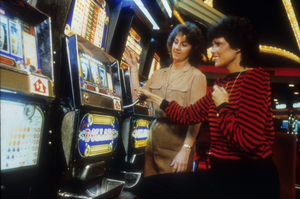
Slide of slot machines at Caesars Palace, Las Vegas, circa late 1970s - early 1980s
Date
1975 to 1985
Archival Collection
Description
Unidentified people playing the million dollar baby slots at the Caesars Palace Hotel and Casino in Las Vegas, Nevada.
Image
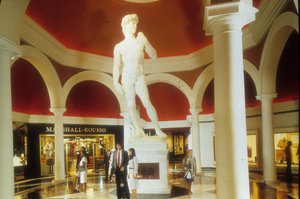
Slide of the Appian Way Shopping Gallery at Caesars Palace, Las Vegas, circa late 1970s - early 1980s
Date
1975 to 1985
Archival Collection
Description
An interior view of the Appian Way Shopping Gallery at the Caesars Palace Hotel and Casino in Las Vegas, Nevada.
Image

Slide of the Appian Way Shopping Gallery at Caesars Palace, Las Vegas, circa late 1970s - early 1980s
Date
1975 to 1985
Archival Collection
Description
The view of a dining area located near the Appian Way Shopping Gallery at Caesars Palace Hotel and Casino in Las Vegas, Nevada.
Image
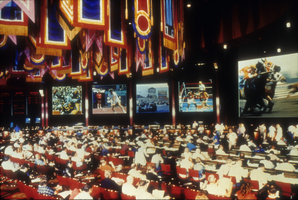
Slide of the Olympiad Race and Sports book at Caesars Palace, Las Vegas, circa 1980s
Date
1980 to 1989
Archival Collection
Description
People inside of the Olympiad Race and Sports book at the Caesars Palace Hotel and Casino in Las Vegas, Nevada.
Image

Slide of the Empress Court at Caesars Palace, Las Vegas, circa late 1970s - 1980s
Date
1975 to 1989
Archival Collection
Description
An interior view of the Empress Court at the Caesars Palace Hotel and Casino in Las Vegas, Nevada.
Image
Pagination
Refine my results
Content Type
Creator or Contributor
Subject
Archival Collection
Digital Project
Resource Type
Year
Material Type
Place
Language
Records Classification
